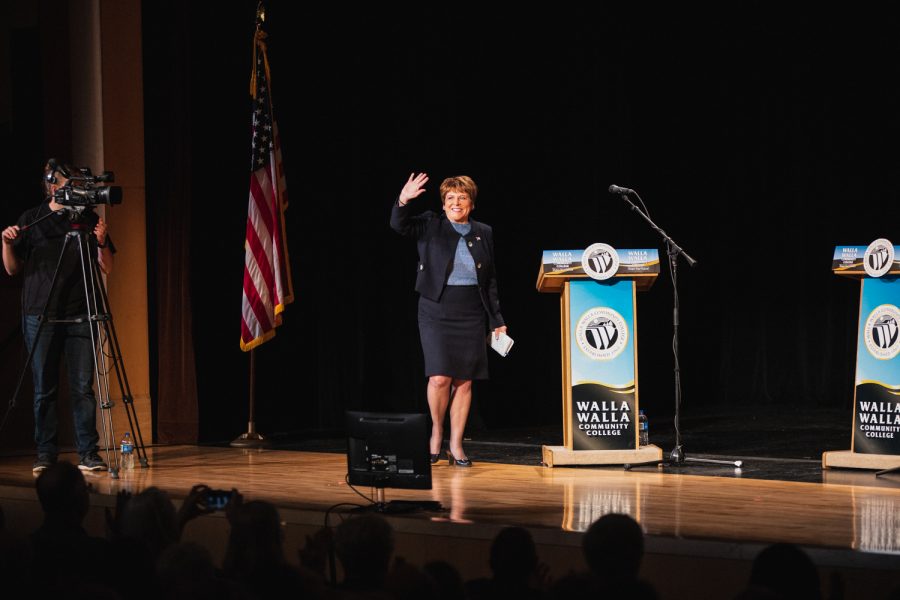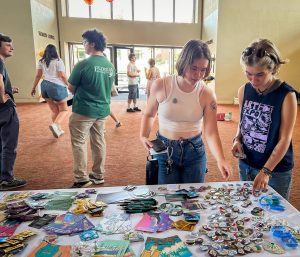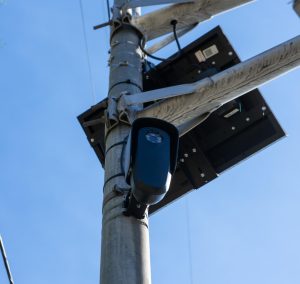Brown V. McMorris Rodgers: Walla Walla Debate
October 30, 2018
On Wednesday, Oct. 24, House Representative Cathy McMorris Rodgers (R.) and challenger Lisa Brown (D.) sparred in their in their last debate prior to Election Day Nov. 6. Brown hopes to unseat McMorris Rodgers who has held her position as Representative of Washington’s fifth congressional district since 2005.
McMorris Rodgers and Brown met for their fourth and final debate at Walla Walla Community College (WWCC), the only debate not hosted within Spokane city limits. The WWCC theater offered 300 tickets ahead of time, but overflow rooms were added to accommodate the students and community members who showed up en masse. For Whitman students who couldn’t attend the debate, the student-led group Planned Parenthood Generation Action offered a “Debate and Ballot Party” on campus the same night. Beyond offering a live screening of the debate, members of the club offered to answer students’ questions about voting in the upcoming election.
The debate was moderated by Walla Walla resident and associate attorney, Bertha Clayton, who questioned the two candidates on the economy, agricultural issues, immigration policy, women’s rights and the #MeToo movement, education, civil discourse in politics, same-sex marriage, climate change and Native American rights.
In her opening statement, McMorris Rodgers focused on her ancestral ties to Walla Walla, as well as the perceived impacts of a Republican-controlled government.
“What a difference two years makes,” McMorris Rodgers said. “Our economy is booming and… it means [that Washington residents] have an opportunity for a better life. Good policy leads to good results… We have rebuilt the military. We are protecting the Columbia Snake River dams which are the foundation of our economy, and isn’t it great that we are making progress on healthy forests.”
Lisa Brown, who has visited Whitman campus on several occasions over the past year, immediately took the offensive against her opponent.
“Sadly, after 14 years, my opponent is increasingly out of touch with what really matters to us,” Brown said. “Instead of running on her record, she’s running away from her record on healthcare and putting her party’s needs above ours. Congress is broken right now. She’s the leader of a congress that has blown a huge hole in the budget, not dealt with healthcare or immigration, and even left town without a farm bill. We can do better. I want to go to Congress and work with our farmers, veterans, students and seniors.”
But it wasn’t just Lisa Brown who was disappointed with Cathy McMorris Rodgers. Moderator Clayton was forced to remind the audience that any noises, whether in approval or dissent, should wait until after the debate.
During the agricultural section, a particularly divisive response from McMorris Rodgers elicited laughter from the crowd.
“A healthy economy depends on healthy ecosystems,” Moderator Clayton said. “President Trump’s administration continues to roll back environmental protections on everything from water, C02 and methane, coal mining and other fossil fuel protections. In your view, do the economic benefits derived from the rollback of these protections outweigh the damage to the environment?”
McMorris Rodgers responded, “The Trump administration is not doing anything to roll back the regulations that are going to hurt the environment.”
This was met with such laughter that the Representative momentarily paused in her speech.
“We are not — they are not lowering environmental standards,” McMorris Rodgers continued. “They are going to make sure those standards are in place… we absolutely agree, we must have clean air and clean water, but it can be done locally better.”
In her rebuttal, Lisa Brown emphasized the benefits of Washington investing in renewable energies.
“The Trump Administration is rolling back protections on clean water and is rolling back the clean power plan,” Brown said. “We, here in Eastern Washington, have so much to gain from moving forward with a clean energy economy. It will be — and we have it — water, solar, wind power. We can help lead the way in the country, and instead, we have a congress that isn’t understanding the threat that is posed by this return to a doubling down on fossil fuel-based economy.”
McMorris Rodgers’ response garnered a similar response from the audience when she spoke on same-sex marriage. Despite her comments on sustainability and agriculture, the congresswoman had, for most of the debate, played to the moderates — in this instance, she affirmed her position as a conservative.
“So I personally believe that marriage is between a man and a woman,” McMorris Rodgers began. “I respect that the Supreme Court has ruled, that the state of Washington has taken action and I respect that same-sex marriage is the law of the land… we are a nation of laws — America believes in the rule of law and equal protection under the law.”
Brown was also asked the same question, but her response, both affirmation of the LGBTQ+ community and critique of her opponent, was met with applause.
“I absolutely support total equality for our LGBT residents here and in our country,” Brown said. “Our state legislature voted to ban discrimination based on sexual orientation. My first year in the legislature in 1993, I was a leader in moving us towards full marriage equality.… I think that it’s clear from what my opponent has stated that if the Trump administration starts to roll back protections or rules that are currently in place for our LGBT citizens, that she will not stand up to the Trump administration.”
While Cathy McMorris Rodgers frequently returned to the progress already made in Eastern Washington, it was Lisa Brown who emphasized the need for change in every response she gave. In her closing remarks she made it clear that her intent in becoming a congresswoman is to pass bills, not just support them.
“It’s not the number of bills [that pass],” Brown said. “It’s whether or not it’s bills that really matter that are addressing the issues today. Let me just repeat: no farm bill, no immigration bill, no bill to address the cost of prescription drugs or the healthcare cost crisis we are in. Working together in a bipartisan way means not blocking the bills that are brought forward by the other side, but bringing them forward for votes. I did that in the legislature and we can do that in Congress.”







